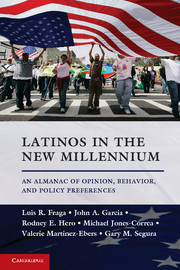Book contents
- Frontmatter
- Contents
- Acknowledgments
- 1 Latinos in the New Millennium
- 2 A Demographic Profile of Latinos in the United States
- 3 Core Values
- 4 Latino Identities
- 5 Latino Transnationalism
- 6 Intergroup Relations
- 7 Civic Engagement
- 8 Latino Media and Technology Usage
- 9 Voter Registration, Turnout, and Choice
- 10 Evolving Patterns and Preferences in Latino Partisanship
- 11 Latinos and Gender Role Attitudes
- 12 Latino Issues and Policy Preferences
- 13 Hope and Reality in Latino Educational Attainment
- 14 Latinos and the Future of American Politics
- Index
- References
8 - Latino Media and Technology Usage
Published online by Cambridge University Press: 05 June 2012
- Frontmatter
- Contents
- Acknowledgments
- 1 Latinos in the New Millennium
- 2 A Demographic Profile of Latinos in the United States
- 3 Core Values
- 4 Latino Identities
- 5 Latino Transnationalism
- 6 Intergroup Relations
- 7 Civic Engagement
- 8 Latino Media and Technology Usage
- 9 Voter Registration, Turnout, and Choice
- 10 Evolving Patterns and Preferences in Latino Partisanship
- 11 Latinos and Gender Role Attitudes
- 12 Latino Issues and Policy Preferences
- 13 Hope and Reality in Latino Educational Attainment
- 14 Latinos and the Future of American Politics
- Index
- References
Summary
Another aspect of the Latino experience in the United States deals with acquiring information about the American political system and politics. This chapter focuses on media usage and news sources among Latinos, as well as their language of preference for those sources. In addition, what has been referred to as a digital divide among racial-ethnic and social-class grouping is examined briefly by exploring Latinos’ access to the Internet. In essence, this chapter represents an introduction to the small but growing area of research and interest regarding Latinos and media use, as well as its application to the world of politics.
Political Knowledge and Media Usage
Gateways to the world of politics can be enhanced by becoming more knowledgeable about the political system, its institutions, and its leadership (Subvervi-Velez 2008). In addition, accounts of governmental actions, policy considerations and debates, and activities of political parties are important pieces of information that direct an individual's civic and political engagement (Johnson and Arceneaux 2010). A major source of that political knowledge comes from mass media outlets. Obviously, media outlets have been expanding in recent years with more nontraditional media (e.g., electronic news, magazines, blogs, social networks, international news media). For the most part, our introductory examination will focus on the two more traditional outlets – newspapers and television. Historically, mass media has been a source of both political facts or news and political expression or opinion on issues, candidates, and public policies (Johnson and Arceneaux 2010).
- Type
- Chapter
- Information
- Latinos in the New MillenniumAn Almanac of Opinion, Behavior, and Policy Preferences, pp. 231 - 247Publisher: Cambridge University PressPrint publication year: 2011



